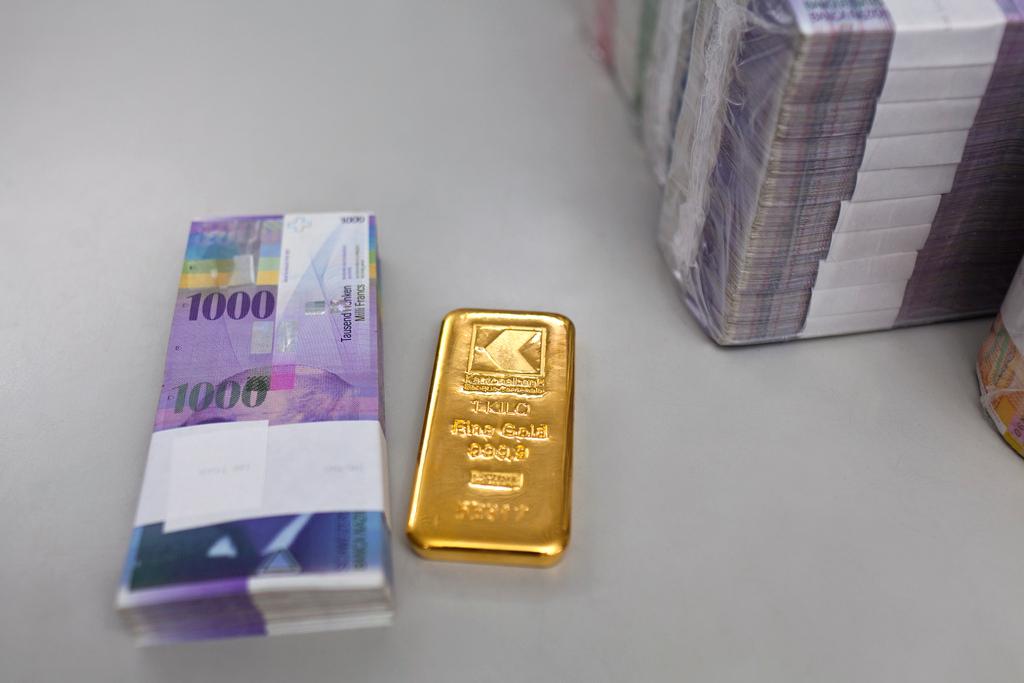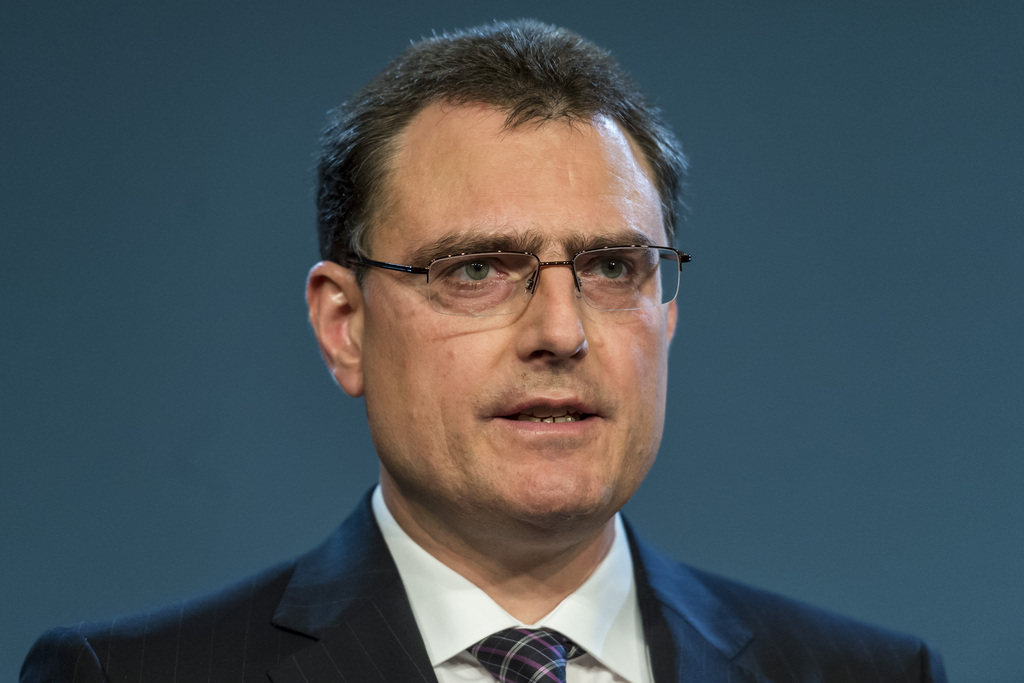The Swiss franc: global reserve or gourmet currency?

The imposition of EU and US sanctions has prompted discussion in Russia about dropping the dollar in transactions between private individuals and at state level. But what should take the dollar's place? Cowrie shells will hardly do. So how about the Swiss franc?
Following the latest political events in Russia, some government representatives and economists have been asking indignantly just how long the country should keep holding the billions from oil and gas sales in US securities. Why should Russia support the economy and currency of a country that has instigated sanctions against it?
According to figures from the US Department of the Treasury for August 2014, Russia has invested $118 billion (CHF114 billion) in US Treasury securities. So how could the dollar realistically be dropped? And where should the reserve billions be invested? This is the question that Russia’s central bank is asking those fierce critics of the cult of the dollar. And they, like magicians, have a long-ready answer up their sleeves – in gold and Swiss francs.
Bye-bye dollar?
The idea of dropping the dollar for settlements surfaced in Russia already in March 2014, when the US and EU were just starting to impose sanctions. Its main proponent was Sergey Glazyev, economic adviser to the Russian president. While the Kremlin did not support Glazyev’s initiative, the idea attracted attention.
Lawmakers started to dust off old bills on the subject. At the same time, efforts were stepped up to switch to ruble transactions with foreign partners. Agreements to this effect were reached with China and North Korea in October 2014.
Significantly, both President Putin and Prime Minister Medvedev had on numerous occasions already called for a gradual transition to the use of the national currency in settlements with foreign partners. Moreover, during the recent global crisis, the heads of the world’s leading states had seriously discussed the possibility of identifying an alternative reserve currency to the dollar.
However any move to stop investing reserves in US securities begs the above question, as posed by the Russian central bank: where should the money be put instead? The Swiss franc certainly seems an attractive alternative, but there’s a big “but”. The Swiss Confederation has very low levels of foreign borrowing, and this is a huge problem for central banks wishing to invest in Swiss assets.
As a reminder, this is how the technical process works: a country that wishes to borrow money on the foreign market issues securities which other countries then acquire, thereby bolstering their reserves. The currency in which the securities are denominated thus becomes a reserve currency. Russia already tried to undertake operations using the Swiss franc in autumn 2009 – to test it as a potential reserve. But, because of the small size of the asset market denominated in that currency, the Swiss franc did not find its way into the portfolio of the Russian central bank.
Better to lose a little than everything
The Swiss franc is extremely popular with investors, but currently the only way to make money with it is on the stock and currency markets. Yet many central banks are also very interested in assets in Swiss francs.
“In the recent crisis the demand for francs was so high that the Swiss National Bank even established a negative rate of return on the securities that other banks bought from it. But investors were not deterred. They were still attracted by the stability of the investments,” explains professor Nikita Krichevsky, doctor of economics and head of research at the Institute of Economics of the Russian Academy of Sciences.
Basically, investors concluded that it was better to lose a little than to lose everything, and the Swiss economy helped provide a way to do this. Firstly, it guaranteed a stable, albeit low, rate of industrial production growth of 1-2% per year. Swiss GDP was $646.2 billion in 2013. Unemployment is among the lowest at 3.2% and there is virtually no inflation.
Although no central bank is averse to diversifying its assets and placing them on the market, it all depends on the capacity of the currency in question.
“The dollar and the euro are backed by huge economies with a capacity of $16 trillion each. The Swiss economy is 25 times smaller,” explains Fedor Bizikov, senior portfolio manager at the company GHP Group.
A sound economy and a stable franc
There are other reasons why Switzerland at present does not want to and will not increase its foreign borrowing, without which the franc cannot become a reserve currency. Firstly, Switzerland has no budgetary problems; its income exceeds expenditure. Generally, states resort to borrowing when they have a deficit.
“Budgetary expenditure is fully covered by domestic revenue, so there is no need to attract additional capital for budgetary needs,” explains Bizikov. For example, in 2013 Switzerland’s budget revenue amounted to $217.8 billion and expenditure was $208.5 billion. Secondly, countries normally need foreign loans in order to invest in their own economies. But here, too, all is well within Switzerland.
“The Swiss economy and its currency are stable,” continues economist Krichevsky. “That’s why the country does not need a flow of investments, but rather specific input into production and agriculture, in order to support economic growth.” Attracting surplus money resources could, in his view, lead to a loss of stability, which is Switzerland’s main trump card.
“The Swiss do not want volatility in their finances. They rely not on speculation but on real production”, he stresses. And what such volatility can lead to, in particular as regards the cross-border movement of capital, is evident not least from the example of Russia, where the flight of funds from the domestic market has triggered a sharp depreciation of the national currency and an increase in inflation. In short, the experts interviewed agreed that the size of the Swiss economy and the question of absorbing large investment flows were not the only reasons why Switzerland was unlikely to increase its foreign borrowing.
Of course, it is possible simply to print money and invest it, for example, in assets abroad, which is something that big states do. But then the question of stability comes up again. Switzerland maintains financial neutrality and relies on stability with low but sustained growth of economic indicators, avoiding speculation.
According to Bizikov, “this is a completely predictable tactic for a small country, which would find it hard to compete with the leading countries in the struggle for global resources, including in the quest for world reserve status for its national currency, all the more so since, seen against the eurozone, the scale is simply not comparable.”
A currency for financial gourmets
The concept of Switzerland as a “safe financial haven” is also very relative. It is itself a major US creditor, and in a certain sense its wellbeing depends on the American economy. According to data from the US Department of the Treasury for August 2014, Switzerland has invested almost $190 billion in US treasury securities, making it the sixth largest US creditor.
No wonder the cautious Swiss are also asking themselves what will happen to their currency reserves. Therefore on November 30, 2014, the country will hold a referendum, the initiators of which are proposing that no less than 20% of the currency reserves of the Swiss central bank should be converted into pure gold and that all reserves should be kept within the country.
Experts doubt that the referendum will significantly affect the financial stability of the Confederation and the position of the franc. “I think that it is a neutral event for the franc. Swiss democracy is just built like that; important matters are not decided without a referendum,” explains Bizikov.
Neither does Krichevsky attach any particular importance to the results of the referendum. “The US holds 75% of its reserves in gold, and Russia 9%. So what? It’s not the amount of gold that determines the stability of the economy, but its reputation and stable indicators.”
So the Swiss franc is too stable and the Swiss economy too successful, and therefore the country has no motive or reason to indulge in speculation on the currency market or to take risks for the sake of securing reserve-currency status for the franc. For the moment the franc will remain as today, a stable niche currency for experts and financial “gourmets”.
Reserve currencies
Although the Swiss franc is one of the top five world reserve currencies, it accounts for no more than 0.3% of the total volume. The main reserve currency remains the US dollar, with over 60% of the foreign exchange reserves of all countries.
States invest about one quarter of their reserves in euro-denominated securities. Pounds sterling, Japanese yen and Swiss francs account for considerably less, namely 4%, 3.9% and 0.2% respectively, according to 2013 figures. Other currencies have a total share of 6.2%.
The first reserve currency in history was the pound sterling. Political changes as a result of two world wars brought the US dollar onto the world stage. The Bretton Woods conference, which laid the foundations for the system of the same name, ultimately led to the dominance of the dollar in international settlements. At the Jamaica currency conference in 1976, the German mark and the Japanese yen received reserve status.
Today the world’s reserve currencies both fulfil the role of units in the international payments system and are used by countries to store and accumulate reserves. States issuing such currencies enjoy a number of advantages. For instance, they can cover a balance of payment deficits with their own monetary unit, as the US is now doing. And they can help strengthen the position of their own companies competing on the global market.
(Translated from Russian by Julia Bassam)

In compliance with the JTI standards
More: SWI swissinfo.ch certified by the Journalism Trust Initiative



You can find an overview of ongoing debates with our journalists here. Please join us!
If you want to start a conversation about a topic raised in this article or want to report factual errors, email us at english@swissinfo.ch.